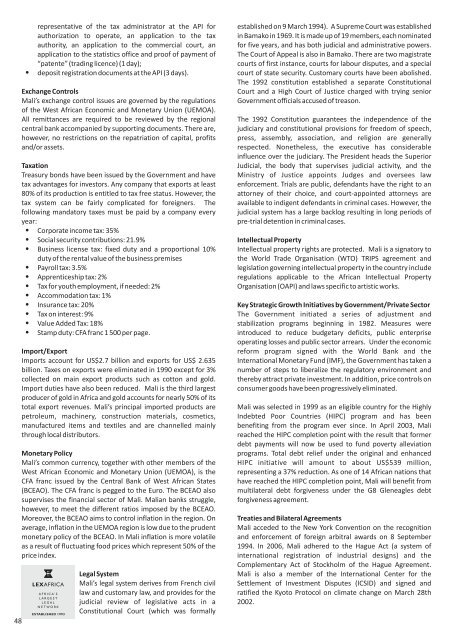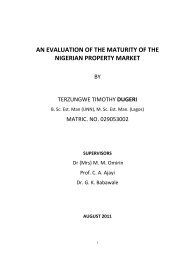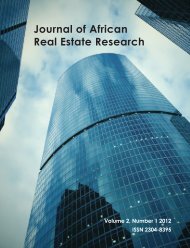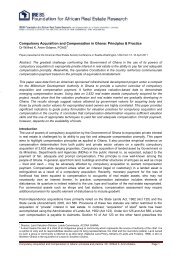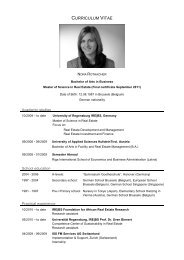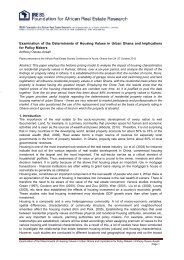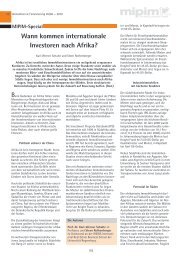You also want an ePaper? Increase the reach of your titles
YUMPU automatically turns print PDFs into web optimized ePapers that Google loves.
epresentative of the tax administrator at the API forauthorization to operate, an application to the taxauthority, an application to the commercial court, anapplication to the statistics office and proof of payment of“patente” (trading licence) (1 day);deposit registration documents at the API (3 days).Exchange ControlsMali’s exchange control issues are governed by the regulationsof the West <strong>Africa</strong>n Economic and Monetary Union (UEMOA).All remittances are required to be reviewed by the regionalcentral bank accompanied by supporting documents. There are,however, no restrictions on the repatriation of capital, profitsand/or assets.TaxationTreasury bonds have been issued by the Government and havetax advantages for investors. Any company that exports at least80% of its production is entitled to tax free status. However, thetax system can be fairly complicated for foreigners. Thefollowing mandatory taxes must be paid by a company everyyear:Corporate income tax: 35%Social security contributions: 21.9%Business license tax: fixed duty and a proportional 10%duty of the rental value of the business premisesPayroll tax: 3.5%Apprenticeship tax: 2%Tax for youth employment, if needed: 2%Accommodation tax: 1%Insurance tax: 20%Tax on interest: 9%Value Added Tax: 18%Stamp duty: CFA franc 1 500 per page.48Import/ExportImports account for US$2.7 billion and exports for US$ 2.635billion. Taxes on exports were eliminated in 1990 except for 3%collected on main export products such as cotton and gold.Import duties have also been reduced. Mali is the third largestproducer of gold in <strong>Africa</strong> and gold accounts for nearly 50% of itstotal export revenues. Mali’s principal imported products arepetroleum, machinery, construction materials, cosmetics,manufactured items and textiles and are channelled mainlythrough local distributors.Monetary PolicyMali’s common currency, together with other members of theWest <strong>Africa</strong>n Economic and Monetary Union (UEMOA), is theCFA franc issued by the Central Bank of West <strong>Africa</strong>n States(BCEAO). The CFA franc is pegged to the Euro. The BCEAO alsosupervises the financial sector of Mali. Malian banks struggle,however, to meet the different ratios imposed by the BCEAO.Moreover, the BCEAO aims to control inflation in the region. Onaverage, inflation in the UEMOA region is low due to the prudentmonetary policy of the BCEAO. In Mali inflation is more volatileas a result of fluctuating food prices which represent 50% of theprice index.Legal SystemMali’s legal system derives from French civillaw and customary law, and provides for thejudicial review of legislative acts in aConstitutional Court (which was formallyestablished on 9 March 1994). A Supreme Court was establishedin Bamako in 1969. It is made up of 19 members, each nominatedfor five years, and has both judicial and administrative powers.The Court of Appeal is also in Bamako. There are two magistratecourts of first instance, courts for labour disputes, and a specialcourt of state security. Customary courts have been abolished.The 1992 constitution established a separate ConstitutionalCourt and a High Court of Justice charged with trying seniorGovernment officials accused of treason.The 1992 Constitution guarantees the independence of thejudiciary and constitutional provisions for freedom of speech,press, assembly, association, and religion are generallyrespected. Nonetheless, the executive has considerableinfluence over the judiciary. The President heads the SuperiorJudicial, the body that supervises judicial activity, and theMinistry of Justice appoints Judges and oversees lawenforcement. Trials are public, defendants have the right to anattorney of their choice, and court-appointed attorneys areavailable to indigent defendants in criminal cases. However, thejudicial system has a large backlog resulting in long periods ofpre-trial detention in criminal cases.Intellectual PropertyIntellectual property rights are protected. Mali is a signatory tothe World Trade Organisation (WTO) TRIPS agreement andlegislation governing intellectual property in the country includeregulations applicable to the <strong>Africa</strong>n Intellectual PropertyOrganisation (OAPI) and laws specific to artistic works.Key Strategic Growth Initiatives by Government/Private SectorThe Government initiated a series of adjustment andstabilization programs beginning in 1982. Measures wereintroduced to reduce budgetary deficits, public enterpriseoperating losses and public sector arrears. Under the economicreform program signed with the World Bank and theInternational Monetary Fund (IMF), the Government has taken anumber of steps to liberalize the regulatory environment andthereby attract private investment. In addition, price controls onconsumer goods have been progressively eliminated.Mali was selected in 1999 as an eligible country for the HighlyIndebted Poor Countries (HIPC) program and has beenbenefiting from the program ever since. In April 2003, Malireached the HIPC completion point with the result that formerdebt payments will now be used to fund poverty alleviationprograms. Total debt relief under the original and enhancedHIPC initiative will amount to about US$539 million,representing a 37% reduction. As one of 14 <strong>Africa</strong>n nations thathave reached the HIPC completion point, Mali will benefit frommultilateral debt f<strong>org</strong>iveness under the G8 Gleneagles debtf<strong>org</strong>iveness agreement.Treaties and Bilateral AgreementsMali acceded to the New York Convention on the recognitionand enforcement of foreign arbitral awards on 8 September1994. In 2006, Mali adhered to the Hague Act (a system ofinternational registration of industrial designs) and theComplementary Act of Stockholm of the Hague Agreement.Mali is also a member of the International Center for theSettlement of Investment Disputes (ICSID) and signed andratified the Kyoto Protocol on climate change on March 28th2002.


